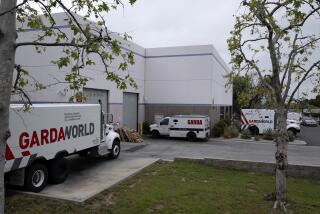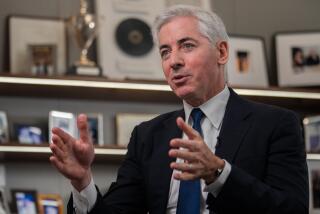Banking Firm Struggles With Loss of Key Leaders
- Share via
NEW YORK — Jimmy Dunne sits in a small side room at a midtown hotel, face red from crying, dress shirt open at the neck. The World Trade Center’s destruction has left him a bitter inheritance.
Dunne, 44, is among the few surviving principals of Sandler O’Neill & Partners, the investment banking firm he founded with his mentor and his best friend. Both are among 67 of the firm’s 167 employees trapped when the south tower fell.
Dunne was not there. He was trying to qualify for an amateur golf tournament. Now he is at the hotel to minister to his remaining crew, who have gathered with relatives and friends to reminisce and take whatever solace they can. He must do this and simultaneously live up to the firm’s promise to be fully back in operation today.
He contemplates a future without Chief Executive Herman Sandler and investment banking chief Christopher Quackenbush, keenly aware how they balanced his own style and shortcomings.
“I no longer have my training wheels,” he says.
Sandler, who stood more than 6 feet tall and shaved his head, was a man of electric drive and vision, prodding the firm to success, a take-charge, stand-up-and-talk-to-the-room kind of guy. Quackenbush was a quieter force, a savvy handler who knew how to earn trust in a world where business turns on personal relationships. What he gave the office, some say, will be the hardest commodity to replace: its soul.
“Herman Sandler was the smartest man I have met in my life,” Dunne said, breaking down. “He was the most compassionate man I’ve met. Christopher Quackenbush was the greatest combination of common sense and intellectual ability.”
Dunne grew up with Quackenbush in Bay Shore, N.Y. They met when they were 14, picking up a few bucks as caddies at the Southward Ho Country Club. They painted houses and tended bar during summer breaks and roomed together after college.
Both Quackenbush and Sandler got nicer as they got more successful, Dunne recalled. By contrast, Dunne called himself “the meaner one, the harder one.” Now, he said, he will have to become a different sort of manager. “Now I have to think about what Herman or Chris would do.”
The firm’s employees are grieving as they also take on new roles.
“I’m extraordinarily frustrated,” said Dick Libretti, who was in Boston when the disaster struck. “It’s like I lost half my family. I’ve been working with some of these guys for 25 years.”
The company was born in 1988 when Sandler quit his job as a senior managing director at massive Bear, Stearns & Co. after a dispute, taking five colleagues with him. They wanted to be their own bosses and set their own rules, recalled Dunne, one of the original sextet.
The firm specialized in mergers, conversions and restructuring jobs for mid-sized savings and loans and commercial banks. Picking off a handful of experts from larger investment banks, it grew to as many as 225 employees in five offices nationwide.
Later, many employees were “home-grown,” starting their careers with Sandler O’Neill and staying on, recalled co-founder Thomas O’Neill, 54, who was in Oregon on business Tuesday. His nephew, Peter O’Neill, who was hired last summer after an internship, is among the missing.
Many employees arrived at Sandler as early as 7 a.m. and worked well into the night, said Fred Price, 47, co-director of the firm’s equity research group. Last year, the firm handled 18 bank and thrift mergers worth $3.3 billion, reaching a peak of profitability.
The company was a place where people knew the names of each other’s children and each other’s golf handicap, a place where generosity was the rule.
Quackenbush was often credited with engendering that sensibility. Every year the die-hard Mets fan would buy bleacher tickets at Shea Stadium and treat 600 poor children from Long Island to a game and hot dogs. The kids would get to meet ballplayers and Mets manager Bobby Valentine, whom Quackenbush counted as a friend.
Quackenbush’s brother, Michael, recalled that during the seventh game of the 1986 World Series, Quackenbush went searching for someone to enjoy his extra ticket, worth $500. He found an 11-year-old boy.
Sunday, Michael commiserated with some of his brother’s colleagues at the company’s makeshift grieving center at St. Regis hotel in Manhattan. He listened as one of the partners remembered ordering lunch from a steak house a couple days before the disaster. When the food arrived, one of the partners prepared to tip the two deliverymen but had only two $50 bills in his wallet. He paused, then said aloud: “What would Quack do?” He gave each man a $50 bill.
“We were a tough crowd. But we were a fun crowd,” said Alicia Broaddus, an executive assistant to one of the firm’s partners. She recalled being part of a 15-member working group that had closed a major deal in June. They cheered and celebrated over an expensive dinner, then went around the table so each person could offer ideas about how the company could improve, she said.
Sandler moved into its 104th floor offices at the trade center just four days before a bomb exploded in the complex garage in 1993.
The 1993 bombing and concern about the millennium computer bug prompted many tenants to back up computer records off-site and develop evacuation plans that no doubt saved lives during Tuesday’s devastation.
But Sandler O’Neill’s lofty location, which gave the firm status, seems to have doomed its staff. About 87 of the firm’s 120 employees at the center had arrived by the time the jetliner struck. Just 20 made it out. “If you left instantly after the plane hit the other building you had a chance,” Dunne said.
The losses cut across the spectrum: analysts who cast skeptical eyes over balance sheets and loan portfolios, wondering whether to recommend buying or selling entire financial institutions; researchers and numbers crunchers who sold bonds and mortgages; smooth talkers who helped facilitate deals in boardrooms, at frequent company-sponsored investment conferences and on golf courses; clerks and other support staff. Most who died were in their 20s and 30s.
In the last few days, business associates and even competitors have offered Sandler O’Neill emergency office space, loans and credit lines. Employees who Dunne fired have called to ask what they could do. “You’re not my favorite person,” one said, “but how can I help?”
The firm has hired grief counselors, set up bank accounts for donations to workers’ families and collected toothbrushes belonging to missing employees so coroners can identify them by their DNA. The survivors are being bolstered by reinforcements from offices in other cities to prepare for today’s symbolic ringing of the opening bell on the New York Stock Exchange.
In their grieving room at the St. Regis, employees have converged daily, sitting in a circle and sharing stories about their loved ones. Some left periodically to weep alone.
Sales trader Doug Jason Irgang, 32, who is still missing, called his mother and fiancee after the first plane hit to tell them everything was OK. An athlete who swam two miles every morning and competed in triathlons, Irgang was to be married in December.
“Successful, athletic, sweet, just a good kid,” said sister-in-law Sari Irgang.
Dunne and the other remaining top executives split their time between the St. Regis sessions and meetings to plan the firm’s future.
Sandler O’Neill urgently needs to restart its business, both to assuage clients’ anxiety and to affirm for itself that it can go forward. Last week it relocated one unit of its trade center operation to extra Manhattan office space leased by an affiliated firm. The rest of the surviving workers are squatting temporarily at Bank of America’s midtown offices.
On Sunday, in the new, barren work space, employees huddled in small groups, consoling each other, preparing for today’s challenge. On the receptionist’s desk was a small American flag. In addition to posting family pictures and drawings by their children, some workers put up photos of company outings with some of the now-missing co-workers.
“The people here aren’t going to let all the hard work of those who are not here come to nothing,” said Paul Haklisch, a partner in the investment division who was in the Midwest on business when the attack occurred. “We are going to succeed.”
On Thursday, Sandler made its first post-attack trade. “We bought and sold bonds for clients,” Dunne said. “The only reason we haven’t done an equity trade yet is that they haven’t opened the equity markets.”
Dunne is determined to resurrect Sandler O’Neill, citing a “moral responsibility” to its clients and its lost founders. He also is determined not to bend to the attackers’ intimidation and, in work, to return to the most comfortable form of expression he knows.
“I’m not a poet. I’m not going to write any poems. I’m not going to write a novel. I’m not going to sing any songs. I’m not a musician. I’m going to do what I can do. I am a Wall Street guy.”
*
Times staff writers Duke Helfand, Jeffrey L. Rabin, Richard Lee Colvin, Kirk Streeter and John L. Mitchell contributed to this story from Los Angeles. Times staff writer Tony Perry and correspondent David Landis reported from New York.
More to Read
Inside the business of entertainment
The Wide Shot brings you news, analysis and insights on everything from streaming wars to production — and what it all means for the future.
You may occasionally receive promotional content from the Los Angeles Times.










